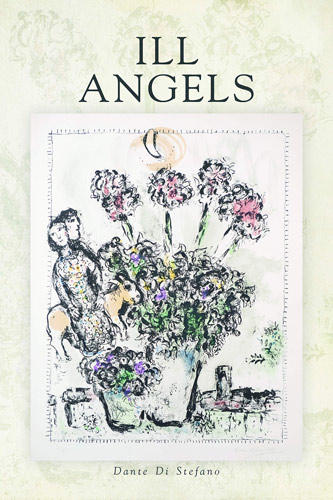‘Ill Angels’ by Dante Di Stefano
 Dante Di Stefano creates a fascinating read of precise opinions and clever phrasing with poetry in his new book, Ill Angels. If I were to divide it roughly into subject chapters, one would be musicians, another would be portraits, then love poems to his wife, verses about America, and poems for his students. Throughout the book, a characteristic worthy of attention is his skill in giving fresh meaning to words.
Dante Di Stefano creates a fascinating read of precise opinions and clever phrasing with poetry in his new book, Ill Angels. If I were to divide it roughly into subject chapters, one would be musicians, another would be portraits, then love poems to his wife, verses about America, and poems for his students. Throughout the book, a characteristic worthy of attention is his skill in giving fresh meaning to words.
 Dante Di Stefano creates a fascinating read of precise opinions and clever phrasing with poetry in his new book, Ill Angels. If I were to divide it roughly into subject chapters, one would be musicians, another would be portraits, then love poems to his wife, verses about America, and poems for his students. Throughout the book, a characteristic worthy of attention is his skill in giving fresh meaning to words.
Dante Di Stefano creates a fascinating read of precise opinions and clever phrasing with poetry in his new book, Ill Angels. If I were to divide it roughly into subject chapters, one would be musicians, another would be portraits, then love poems to his wife, verses about America, and poems for his students. Throughout the book, a characteristic worthy of attention is his skill in giving fresh meaning to words.
You’ll notice this in “Channeling Sonny Rawlins,” for example. Rawlins is just one of the musicians who often jumpstart Di Stefano’s poetry: “I aristocrat this gutter bellow / you might be apt to label Jazz standard.”
In “Anthem for Paisley Park,” he writes, “you have purpled over names / you’ve heard in pop songs, [ . . . ].” And how about this wording in “Channeling Satchmo” that reads with its own musicality:
Artichoke the melody that catches
baritone with blasphemy and handcuffs
caterwaul to the welling-up within,
determined by what you wish to kiss on.
One of Di Stefano’s portraits in verse is titled “Self-Portrait Illuminating the Initial ‘D’.” Here he captures ‘D’ words before coming to:
Dub me Denzel in Training Day. Dub me
Don Juan. [ . . . ] Delete my name from
the digital ether. Design my face
on the flipside of a lost gold doubloon.
Then, heads-or-tails me. Decide my future.
Portraits and love combine in a couple of pieces, including “Portrait of My Wife Listening to Nina Simone.” In this, Di Stefano’s wife is washing dishes while caught up in Nina Simone’s powerful song, “22nd Century”:
for eight minutes and forty four
seconds, she is all liquid melody
and revolt fused to the voice that razes
and soars, breaks dinner plates, unties aprons,takes off a blue terrycloth bathrobe, shakes
glory and protest, dances in a voice
that unlooses the animal inside
the animal clawing a tomorrowfrom the guts of a cuss twirled at what cages.
Then there’s the current state of America, which Di Stefano can’t ignore. His poem “The 45th” takes the form of a prayer:
Lord, let us pledge allegiance to the meek,
reject the bomb, the bombast, the language
of tirade, tyrant, the compendium
of invective pliéng one nation.
Di Stefano further comments on the state of our country in other ways, including one poem I kept coming back to: “The Greening of Harriet Tubman,” about the decision in 2016 to replace Andrew Jackson with Tubman on the $20 bill. He expresses his thoughts:
She won’t be pictured in a blue bonnet
with chickens under her arms,
intrepid, about to leap once again
from the Polaris she carried inside
her chest to the free states plotted outside
her body.
[ . . . ] Instead, you’ll see this proud face circulate
like the report of a Springfield rifle
through the evergreens in deepest winter.
Di Stefano’s teaching positions at both New York’s Binghamton University and Union-Endicott High School inspire many of his pieces. This is from “For My Creative Writing Students”: “You are still growing / into the wool of the self and the bruise / of your own stories.”
Then there are poems that defy categorization. I was emotionally struck by two completely different ones about children: “Verrückt” and “My Goddaughter Chews Happiness.” Each displays the versatile range of Di Stefano’s skills. “Verrückt” is a hymn for ten-year-old Caleb Schwab who was killed on the Verrückt waterslide in 2016. This poem brought to mind my favorite James Dickey poem, “Falling,” about a stewardess who fell from an airplane when an emergency door opened in flight. In Di Stefano’s piece, he writes:
When he had become plummet, his body
widened into raft and dropped, hovering
toward the lonely dampness of the dirt
like a helicoptering maple seed.[ . . . ] He was there, as he is there now, a new
physique built of wings and breaking joyful
on endless lullaby, a divine form
a word as holy as mother, as star, [ . . . ]
In the second one, “My Goddaughter Chews Happiness,” Di Stefano writes with gentleness, painting a scene of goddaughter Mae crawling “like a half-drunk / crab on the ocean floor” and wishes for her: “I hope that you / forever hold happiness in this way, / effortlessly on the tip of your tongue.” Di Stefano himself seems to write effortlessly, his words creating images and tones that propel the reader through this thoughtful, clever book of poetry.
Review by Valerie Wieland




